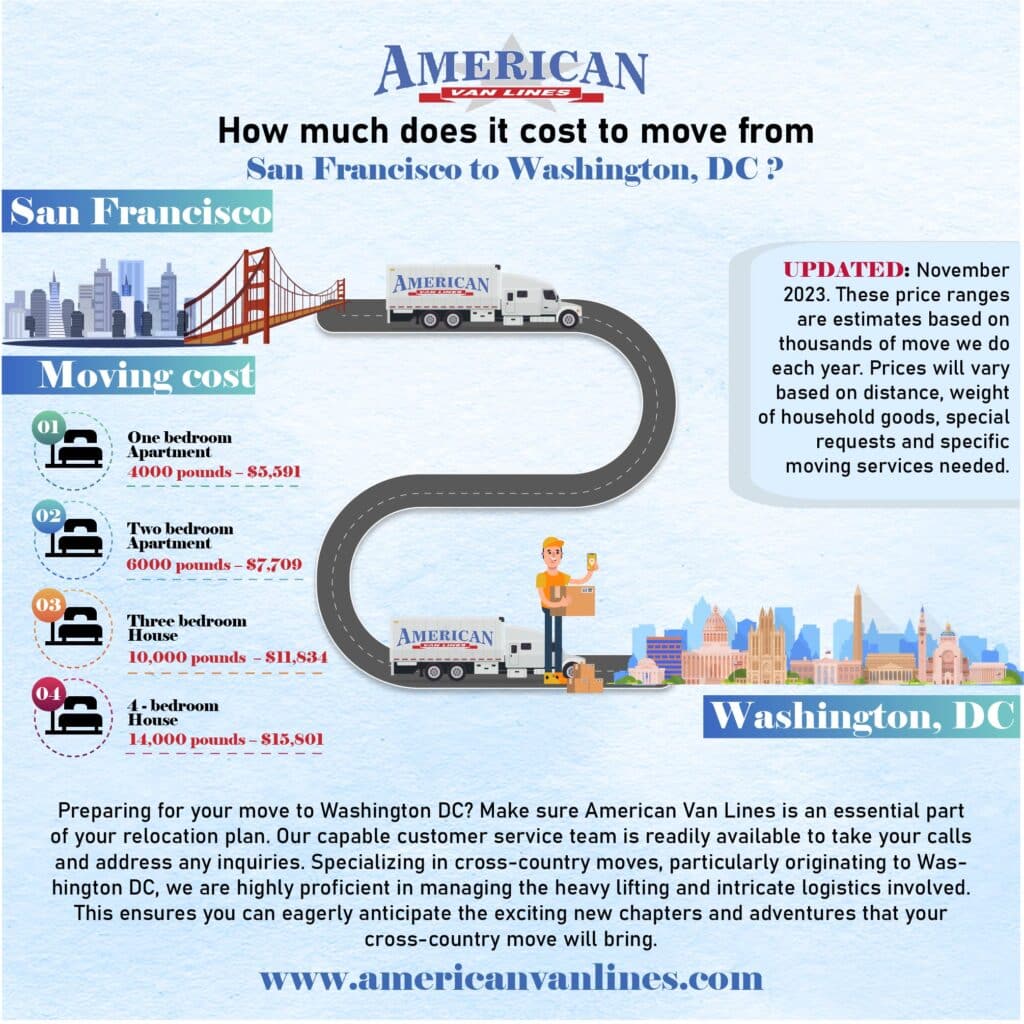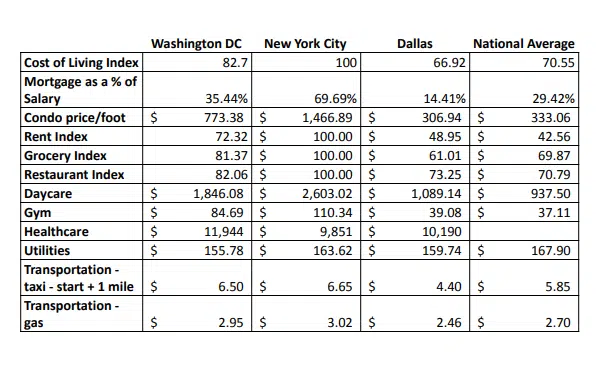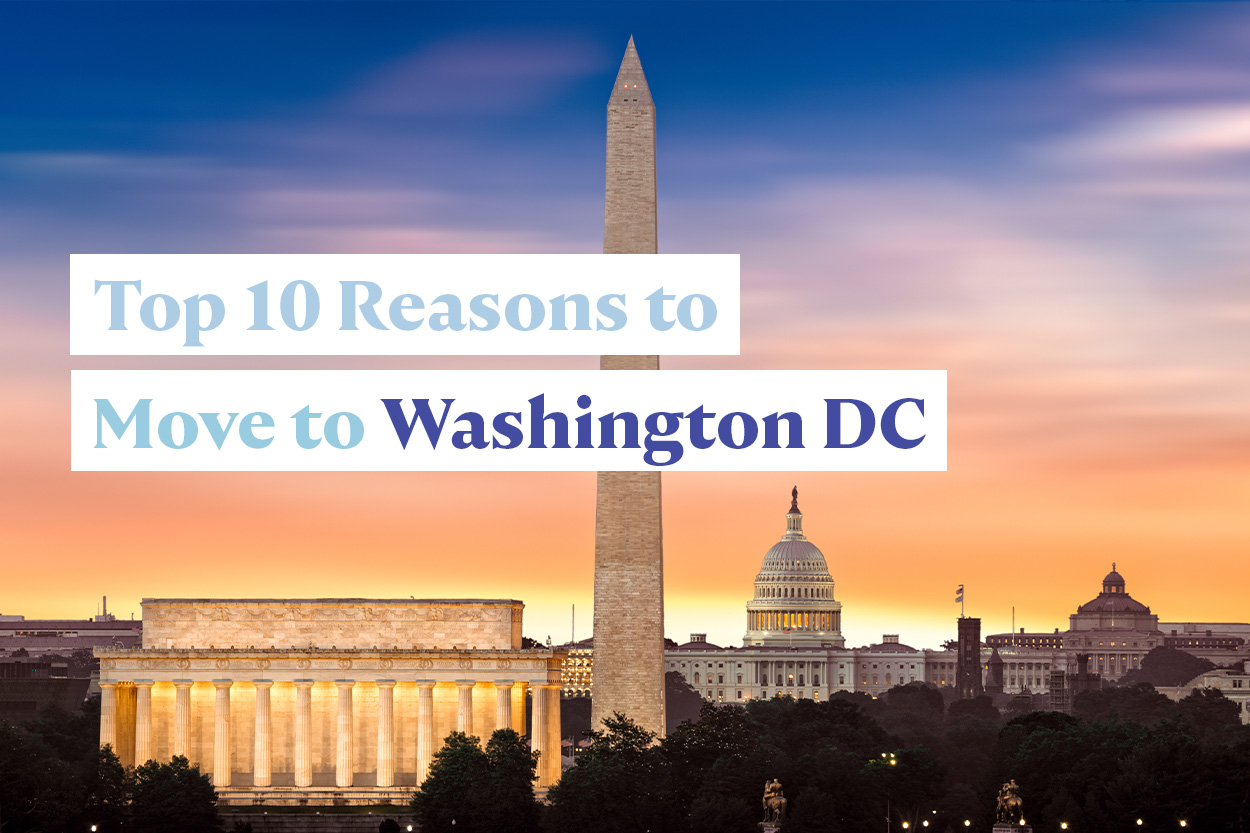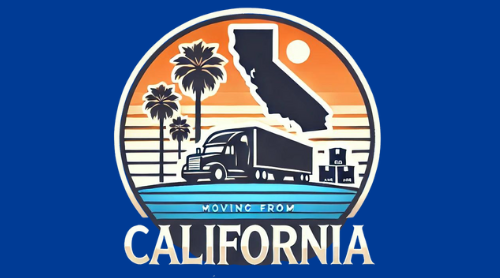Moving From Oakland To Washington DC
Are you considering a cross-country move from Oakland, California to Washington D.C.? If so, you're likely weighing the pros and cons of leaving the West Coast for the nation's capital. From Oakland's vibrant arts and cultural scene to Washington D.C.'s rich history and politics, these two cities couldn't be more different. But what can you expect from the move itself? What are the logistics, costs, and lifestyle changes that come with relocating from Oakland to Washington D.C.? In this article, we'll break down everything you need to know to make a successful transition.

- Planning a Successful Move from Oakland to Washington DC
- Is it worth it to move to Washington, DC?
- How much does it cost to move from CA to DC?
- How much money do you need to move to Washington, DC?
- Why are people moving to Washington, DC?
- FAQ
- What are the main differences between living in Oakland and Washington D.C.?
- How do I plan and execute a successful cross-country move?
- What are the best neighborhoods to live in Washington D.C. for someone moving from Oakland?
- How do I get involved in the community and make friends in Washington D.C.?
Planning a Successful Move from Oakland to Washington DC
Moving from Oakland, California to Washington D.C. can be a daunting task, especially considering the distance and differences between the two cities. However, with proper planning and preparation, you can make this move as smooth and stress-free as possible. Here are some key factors to consider as you plan your move:
Understanding the Cost of Living Difference
One of the most significant differences between Oakland and Washington D.C. is the cost of living. Washington D.C. has a much higher cost of living compared to Oakland, with prices for housing, food, and transportation being significantly higher. According to data from Council for Community and Economic Research, the cost of living index in Washington D.C. is 146.4, compared to 134.6 in Oakland. This means that you may need to adjust your budget accordingly to accommodate the increased costs.
Job Opportunities and Career Advancement
Washington D.C. is a hub for job opportunities, particularly in the fields of politics, non-profit, and government. If you're moving for career advancement, you'll find a wide range of job opportunities available. However, it's essential to research the job market and network with professionals in your field before making the move.
Climate and Weather Adjustments
Oakland and Washington D.C. have distinct climates, with Oakland experiencing a Mediterranean climate and Washington D.C. having a humid subtropical climate. Be prepared for hot and humid summers, as well as cold winters, in Washington D.C. Additionally, the city experiences a moderate amount of rainfall throughout the year.
Housing Options and Neighborhoods
Washington D.C. offers a range of housing options, from apartments to single-family homes, in various neighborhoods. When choosing a neighborhood, consider factors such as commute time, safety, and amenities. Some popular neighborhoods include:
| Neighborhood | Median Rent | Median Home Price |
|---|---|---|
| Adams Morgan | $2,300/month | $640,000 |
| Columbia Heights | $1,900/month | $450,000 |
| Foggy Bottom | $2,800/month | $800,000 |
Getting Around the City
Washington D.C. has a comprehensive public transportation system, including the Metrorail and bus systems. Additionally, the city is bike-friendly, with numerous bike lanes and rental options available. If you plan to own a car, be prepared for heavy traffic and limited parking options. Consider investing in a SmarterCard, which allows you to pay for public transportation, parking, and other services with a single card.
Is it worth it to move to Washington, DC?
/cdn.vox-cdn.com/uploads/chorus_asset/file/19123950/GettyImages_975466978.jpg)
Moving to Washington, D.C. can be a great opportunity for many people. With its unique blend of politics, culture, and history, the nation's capital offers a unique experience that can't be found anywhere else. However, like any city, it has its pros and cons, and whether or not it's worth moving to depends on an individual's personal preferences, goals, and priorities.
Job Opportunities and Career Advancement
Washington, D.C. is a hub for professionals in various industries, particularly in politics, law, and non-profit work. The city is home to many government agencies, think tanks, and advocacy groups, offering a wide range of job opportunities. Additionally, the city has a strong startup ecosystem, with many incubators and accelerators supporting entrepreneurs and small businesses. Some of the top industries in Washington, D.C. include:
- Government and Politics: Many government agencies, including federal executive departments, Congressional offices, and independent agencies, are headquartered in Washington, D.C.
- Non-Profit and Advocacy: The city is home to many non-profit organizations, advocacy groups, and think tanks, offering job opportunities in fields such as policy, research, and community outreach.
- Technology and Startups: Washington, D.C. has a growing startup ecosystem, with many incubators, accelerators, and coworking spaces supporting entrepreneurs and small businesses.
Cost of Living and Quality of Life
The cost of living in Washington, D.C. is relatively high compared to other cities in the United States. The city has a high median home price, and the cost of rent, food, and transportation can be steep. However, the city also offers many amenities and benefits that can enhance one's quality of life. Some of the advantages of living in Washington, D.C. include:
- Cultural Attractions: The city is home to many world-class museums, galleries, and performance venues, offering a rich cultural experience.
- Parks and Outdoor Spaces: Washington, D.C. has many parks and outdoor spaces, including the National Mall, Rock Creek Park, and the Capital Crescent Trail.
- Public Transportation: The city has a comprehensive public transportation system, including the Metrorail and bus systems, making it easy to get around without a car.
Education and Healthcare
Washington, D.C. is home to many top-ranked universities and research institutions, offering a wide range of educational opportunities. The city is also served by several high-quality hospitals and medical centers, providing access to excellent healthcare. Some of the top educational institutions in Washington, D.C. include:
- Georgetown University: A private research university known for its programs in law, business, and international relations.
- George Washington University: A private research university with strengths in fields such as business, engineering, and public health.
- Howard University: A historically black university with a strong reputation in fields such as law, medicine, and the arts.
How much does it cost to move from CA to DC?

The cost of moving from California (CA) to Washington D.C. (DC) can vary greatly depending on several factors, including the distance, weight, and type of items being moved, as well as the services required.
Factors Affecting the Cost of Moving
The cost of moving from CA to DC can be affected by several factors, including:
- Distance: The distance between California and Washington D.C. is approximately 2,796 miles, which can impact the cost of fuel, labor, and transportation.
- Weight and volume: The weight and volume of the items being moved can also impact the cost, as heavier and bulkier items require more resources and labor to transport.
- Type of items: The type of items being moved, such as furniture, electronics, or specialty items, can also affect the cost, as some items may require special handling or equipment.
Estimating the Cost of Moving
To estimate the cost of moving from CA to DC, you can consider the following:
- <strong 평균 cost: The average cost of a long-distance move from CA to DC can range from $4,000 to $10,000 or more, depending on the factors mentioned above.
- Moving company quotes: Getting quotes from reputable moving companies can help you estimate the cost of your move, and can range from $2,000 to $5,000 or more, depending on the services required.
- DIY moving: If you choose to move yourself, you can estimate the cost of fuel, tolls, and equipment rental, which can range from $1,000 to $3,000 or more, depending on the distance and weight of your items.
Additional Costs to Consider
In addition to the cost of moving, you should also consider the following expenses:
- Packing supplies: The cost of packing supplies, such as boxes, tape, and bubble wrap, can range from $100 to $500 or more, depending on the amount of items being packed.
- Travel and accommodation: If you need to travel to or from CA or DC, you should factor in the cost of travel and accommodation, which can range from $500 to $2,000 or more, depending on the distance and mode of transportation.
- Insurance and storage: You may also need to consider the cost of insurance and storage, which can range from $100 to $1,000 or more, depending on the value and type of items being moved.
How much money do you need to move to Washington, DC?

The cost of moving to Washington, D.C. can vary greatly depending on several factors such as the distance of your move, the size of your household, and your lifestyle. However, here are some general guidelines to help you estimate the amount of money you may need to make the move:
Initial Expenses
When moving to Washington, D.C., you'll need to consider the following initial expenses:
- Security deposit: This can range from $1,000 to $3,000, depending on the landlord and the type of accommodation.
- First month's rent: This can be anywhere from $1,500 to $5,000, depending on the location, size, and type of accommodation.
- Moving costs: This can range from $2,000 to $5,000, depending on the distance of your move and the size of your household.
Ongoing Expenses
In addition to the initial expenses, you'll need to consider the following ongoing expenses:
- Rent: The average rent in Washington, D.C. is around $2,000 to $4,000 per month, depending on the location and size of the accommodation.
- Utilities: You can expect to pay around $100 to $300 per month for utilities such as electricity, water, and gas.
- Food and transportation: These costs can vary greatly depending on your lifestyle, but you can expect to pay around $500 to $1,000 per month for food and transportation.
Additional Expenses
Depending on your individual circumstances, you may also need to consider the following additional expenses:
- Furniture and appliances: If you're moving to a new place without furniture or appliances, you may need to budget an additional $1,000 to $5,000.
- Pet fees: If you have pets, you may need to pay an additional $25 to $100 per month in pet fees.
- Parking fees: If you plan to own a car in Washington, D.C., you may need to budget an additional $100 to $300 per month for parking fees.
Why are people moving to Washington, DC?

Washington, D.C. has become a popular destination for people from all over the country, and even the world. There are several reasons why individuals are flocking to the nation's capital. Here are some of the main reasons:
Job Opportunities and Career Advancement
Washington, D.C. is home to a plethora of job opportunities, particularly in the fields of politics, non-profit, and government contracting. The city is also a hub for startups and entrepreneurship, with many incubators and accelerators supporting new businesses. Additionally, the presence of many Fortune 500 companies and international organizations provides a wide range of career advancement opportunities.
Many government agencies, including the State Department and Department of Defense, are headquartered in D.C.
The city is also home to many lobbying firms, think tanks, and advocacy groups.
The tech industry is growing rapidly in D.C., with companies like Amazon and Microsoft having a significant presence.
Education and Cultural Opportunities
Washington, D.C. is renowned for its world-class museums and cultural institutions, including the Smithsonian Institution and the National Gallery of Art. The city is also home to many top-ranked universities, including Georgetown University and American University.
The city has a vibrant arts scene, with numerous galleries and performance venues.
The National Zoo and Conservatory are popular attractions for families and nature lovers.
The city hosts many cultural festivals and events, including the Cherry Blossom Festival and Smithsonian Folklife Festival.
Quality of Life and Diversity
Washington, D.C. is known for its diverse community, with people from all over the world living and working in the city. The city also offers a high quality of life, with access to good healthcare, recreational activities, and public transportation.
The city has a thriving food scene, with many restaurants and food trucks serving a wide range of cuisines.
The Metrorail system and bus network make it easy to get around the city without a car.
The city has many parks and green spaces, including the National Mall and Rock Creek Park.
FAQ
What are the main differences between living in Oakland and Washington D.C.?
When considering a move from Oakland to Washington D.C., it's essential to understand the significant differences between these two cities. Cost of living is one of the most notable differences, with Washington D.C. being one of the most expensive cities in the United States. Oakland, on the other hand, has a relatively lower cost of living. Additionally, climate plays a significant role, with Oakland experiencing a Mediterranean climate and Washington D.C. having a humid subtropical climate. Job opportunities also vary, with Washington D.C. being a hub for politics and government jobs, while Oakland has a strong presence of tech companies. Lastly, culture differs, with Oakland being known for its vibrant arts scene and Washington D.C. being steeped in history and politics.
How do I plan and execute a successful cross-country move?
Planning and executing a successful cross-country move from Oakland to Washington D.C. requires careful consideration and attention to detail. Start early and create a moving binder to keep track of important documents, contracts, and receipts. Downsize and declutter your belongings to reduce the amount of items to be moved, and consider hiring professional movers or renting a moving truck depending on your needs and budget. Research moving companies and read reviews to ensure you're hiring a reputable company. Pack wisely, using sturdy boxes, packing paper, and labels to prevent damage during transit. Finally, plan for logistics, such as changing your address, setting up utilities, and transferring important services like healthcare and insurance.
What are the best neighborhoods to live in Washington D.C. for someone moving from Oakland?
When moving from Oakland to Washington D.C., it's essential to find a neighborhood that fits your lifestyle and preferences. Shaw and Columbia Heights are popular neighborhoods that offer a mix of affordability, diversity, and access to amenities. Adams Morgan is known for its vibrant nightlife and eclectic mix of restaurants and shops. Navy Yard is a rapidly developing area with new apartments, restaurants, and amenities. Capitol Hill is a historic neighborhood with a strong sense of community and easy access to the Capitol Building. Consider factors like commute time, safety, and amenities when choosing a neighborhood that's right for you.
How do I get involved in the community and make friends in Washington D.C.?
Making friends and getting involved in the community is crucial when moving to a new city like Washington D.C. Join local groups and clubs that align with your interests, such as hiking, book clubs, or sports teams. Volunteer for causes you're passionate about, which is a great way to meet like-minded people. Attend local events and meetups, such as concerts, festivals, or street fairs. Network and attend industry events related to your profession to expand your professional circle. Finally, be open and friendly, introducing yourself to your neighbors and striking up conversations with strangers. By taking these steps, you'll be well on your way to building a strong social network in Washington D.C.
